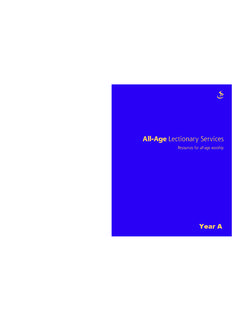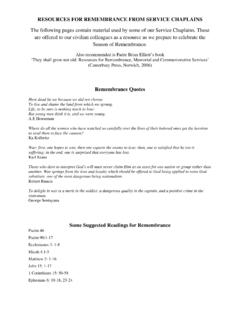Transcription of Remembrance Day Resources - ICF-Faith on a Mon
1 2010 Industrial Christian Fellowship and North Western Baptist Association Remembrance Day Resources Recent events and the public response to them, mean that acts of Remembrance are becoming increasingly commonplace in our society. As well as Sunday services, individuals are coming together in workplaces, shopping centres and other public spaces to engage in acts of Remembrance . These prayers, readings and reflections have been developed and used in various contexts and are offered either to be used together, or as separate components in other services. They can be adapted for specific circumstances or might perhaps simply stimulate other thoughts and ideas for those who are tasked with preparing such services. The opening part of the call to worship , might well be useful in a workplace setting, particularly if the opening phrase citizens of earth and heaven is adapted or added to reflect a particular context We come together today As friends, colleagues and perhaps strangers But bound in common humanity (Citizens of earth and heaven) To pause, be silent and remember: 2010 Industrial Christian Fellowship and North Western Baptist Association Remembrance Day Introduction and Call to worship We come together today Citizens of earth and of heaven To remember.
2 To remember with pride and appreciation Those who have given their lives in service of others To remember with dismay The suffering, destruction and pain caused by human conflict To remember with gratitude Those whose lives, love and friendship, ours has been the privilege to share To remember with sadness Those whose death has caused us loneliness and pain We come together not to glorify war and conflict But to recognise its cost And commit ourselves to be peacemakers and peacekeepers Wherever that opportunity falls within our grasp. Whatever our view And whatever part we may have played in the theatres of combat We express our common humanity By pausing to recognise the value and worth of every life lost, And so express the mystery That to be human Means we are both marred by our common failings Yet fashioned in the image of our Creator.
3 And in our act of Remembrance We give God thanks for memory itself; Through which we are forever warned by the mistakes of the past, And enriched by experiences that can no longer be known in the present. Let us pray: Almighty God we seek your presence as we come together in this act of Remembrance . Help us not to hide from you our sorrow and our pain as you also inhabit our joy and thanksgiving. May all our acts be open to your scrutiny, that we might indeed strive upon this earth, to embrace the values of Heaven. By Your Holy Spirit enfold us afresh in your love and healing, and through the sacrifice of Calvary, inspire us again with the promise of eternal life, and that great example of self-giving. You have called us to take up the cross and to follow You, yet too often we prefer the tools of war and words of conflict.
4 We acknowledge our failure to live as true children of one Creator; forgive us that which cannot be undone; comfort us as we live with its consequences and empower us to build a better world in service and obedience to You. Through Jesus Christ our Lord AMEN 2010 Industrial Christian Fellowship and North Western Baptist Association Act of Remembrance So we stand in silence together and in the presence of God to remember. Silence Age shall not weary them Nor the years condemn At the going down of the sun and in the morning We will remember them Response: We will remember them A powerful reflection of the cost and sacrifice of war can be found in Sebastian Faulks novel Birdsong . The final paragraphs of the second to last chapter of part 2, (page 236 of the 1994 paperback edition) desribe in moving terms the platoon roll-call on the morning after battle.
5 For copyright reasons it cannot be reproduced here, but would make a moving and dramatic reading in a service of Remembrance . 2010 Industrial Christian Fellowship and North Western Baptist Association Sermon Outline Phil 1:3-9: I thank my God every time I remember you (if this is done in an all age context, the leader might begin with some sort of memory game in which the younger members particularly might participate. There could also be a reminiscence period in the service when congregants might share stories and memories of days and events gone by. These do not necessarily need to be associated with war.) Memory is an interesting thing. Think back to some of your earliest memories. Some will be quite vivid, others will not and we might struggle to understand why particular events or scenes are so etched into our consciousness.
6 Memory is not always neat and logical, but it enables us to see beyond the immediate the memory of a good holiday might cheer us up on a particularly grey and overcast day; memories of friends and loves ones enable us to continue and develop our relationships when we see them again. Imagine how strange it would be if every time we met people we had to learn again who they are and what they were like. Paul s letter to the Philippians is written at a particular dark and difficult moment in his life. He tells us elsewhere that he is not even sure if we will be spared for many more days; he is imprisoned and expecting execution. Yet he describes his state of mind as one of thankfulness, joy and confidence. This is not because of his immediate circumstances, but his capacity to remember.
7 He remembers the care and affection of his friends in Philippi; he remembers the things God has been doing in and through them; he remembers their common purpose of sharing the Gospel; and he remembers that God will be with him no matter what. Sometimes we prefer not to remember. Blanking out particularly traumatic memories is one of the ways our human minds cope with some of the particularly unpleasant things that happen to people. But even when we have the capacity to remember, we sometimes prefer not to believing that if we can somehow blank out the memories, then we can blank out the pain of what we have lost. But memory is a gift to us, it is that part of a loved one or friend that can never be taken from us, our memories of them are safe and can be drawn on as part of the healing process.
8 But as Paul sat, a condemned man - chained and guarded, he had more than just his memories to sustain him, he had his God. And while his Philippians friends could only be with him through the power of memory and recollection, God was sufficiently present for Paul to be able to give thanks to Him, there and then. As he looked at the chains that shackled him; as he thought of the future and recognised the likelihood of execution, he might easily have argued that he had little to thank God for. But as he trawled through the recesses of his mind, they were full of memories and experiences that gave him great cause to be thankful. Coming together today to remember, and doing so in the presence of God, is a powerful opportunity. For some of us here, the pain of loss and parting might be so great that we too struggle to believe that we have anything to thank God for.
9 But God has given us the capacity to remember, and He invites us to use those memories not to rub salt into the wounds of the present, but to discover that even in our present struggles and pain we can find cause to be thankful. And as we express our thanks to Him, so we begin to discover His presence, giving us the strength and healing that we need. But there were perhaps other remembrances which came to Paul s mind as he sat in his chains. There would once have been a time when he would have been delighted to see a Christian activist condemned and imprisoned. We first meet him in the book of Acts, not as a Christian Missionary, but as a persecutor of the Church. As he reflected on his own condition, he must have realised the suffering and injustice that he was once the cause of.
10 Sometimes our acts of Remembrance are tinged with a sense of guilt; wondering if we could have done more; wishing we might have made more of our parting; or perhaps even feeling guilty that we have survived when others haven t. When we read Paul s letters, he has much to say about God s grace, mercy and forgiveness. Had he not been able to grasp this lavish expression of God s nature, then he would never have been able to be such an energetic and active member of the Christian community. The first lesson that Paul had to learn about God was that he was a God of forgiveness, a God who could offer healing, restoration and a new start. Perhaps we too might sometimes struggle to remember, because our own acts of Remembrance are tinged with a sense of guilt.







